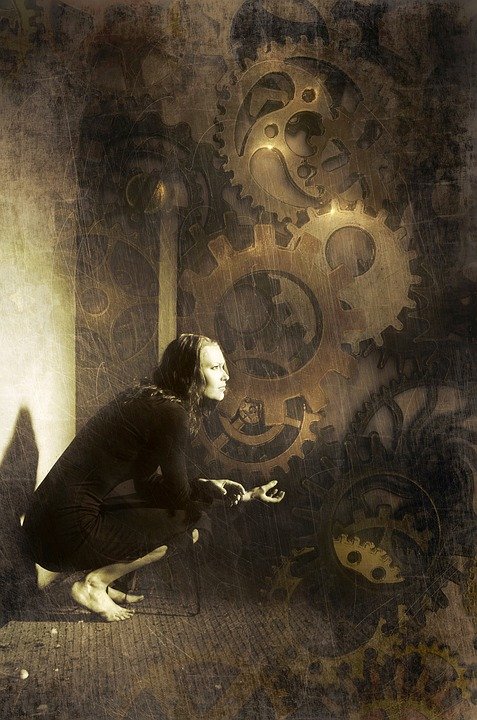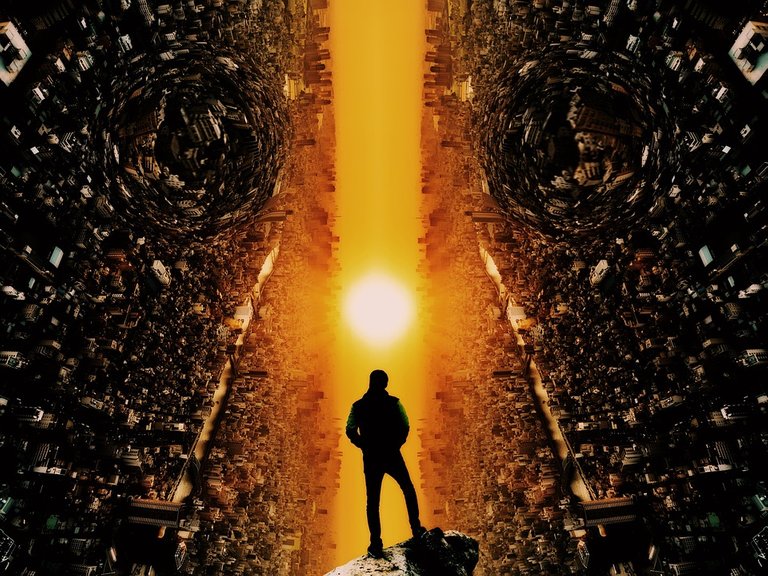Since the day of Marx

Main Concepts
Scientific Inevitability
Utopia
Capitalism vs. Socialism
Communism
Scientific Inevitability : The 4th Industrial Revolution

As we approach closer and closer to the tipping point where automation will replace well-over 90% of the world's menial and advanced tasks (historically always performed by human labor), the creation of a system of global-governance capable of putting an end to material poverty, ushering in an era of unprecedented material-abundance, and other features of "scientific inevitability" are quickly becoming reality.
Whether one chooses to call these changes utopian or dystopian is somewhat beside the point as that is entirely a matter of subjective opinion. The truth is, with advances in technology, and the coalescence of convergent dynamic trends, we are soon to embark on a radical revolution. Except that this revolution poses an unanswered, and perhaps as of yet, unanswerable problem.
What I'm referring to is the idea that in a global, technologically-advanced society, human labor may very quickly become entirely worthless because it's productive capacity will have been greatly outpaced by the productive capabilities of highly-sophisticated automated machinery.
Computers may be able to solve human problems with a degree of efficiency that human beings, limited by their biology, have just simply never been able to achieve.
I'm talking about the extraction, exploitation, production and distribution of raw materials and finished goods, the maintenance of infrastructure, the administration of complex systems, the provision of vital and non-vital services, and the innovation, development, engineering, and deployment of utilities.
What I'm talking about is that from waste management, to medical care, to transportation, to scientific exploration... From agricultural and industrial production, to the upkeep of vital and non-vital goods and services distribution hubs, machines will be able to complete more tasks in a faster, cheaper, safer and more reliable manner.
And this poses the great question: if human beings no longer needed to work to live, which has been the basis of all civilizations and cultures in recorded history, what would happen to us?
Utopia : Man's Greatest Challenge

There have been various stages of utopian thought almost as far back as history goes, from Plato's Republic to Sir Francis Bacon's The New Atlantis. Secular utopianism, however, has been a hallmark of industrialized capitalism, both in a normative and theoretical sense from the very onset of the industrial revolution. (By this, I simply mean that elites have always made the argument to justify the legitimacy of this economic system that under a market-economy and vibrant private-sector, an increasingly exponential amount of people would be able to lift themselves out of poverty and increase their quality of life.)
This vision of utopia developed with the simultaneous impact of modern capitalism, the Enlightenment, and the French Revolution. It is here that the idea of utopia was connected with historical evolution, thus giving secular utopianism its powerful historical force.
This is where socialist utopias emerge as a major challenge to conventional capitalist thought. And it is here that both Marx and Engels become most ardent critics to the authors and their ideas.
Yet I contend that even the most fervent, ardently-critical and deep-thinking socialist and communist theorists of all the 19th and 20th century could have never predicted in their wildest dreams the form that such a system would take. One can read Marx's description of a "communist" society, and in this day and age it becomes comically laughable. (Like reading a Jules Verne novel about taking 80 days to travel the globe like this is somehow impressive to us in this day and age)
However, there is one inherently and incredibly fascinating point in Marx's theories which is of great interest to my analysis of current global trends, and this is the Marxist idea that all economic and political systems could one day converge into...
One, perfect, classless, automatic, government-less system based on common ownership of all the economic means of production.
Capitalism vs. Socialism

Regardless of what one gets out of Marx's writings, his material theory of history, his views on socialist revolution, and all the like: this last bit was an incredibly prescient and futuristic insight into the trends that were already well-entrenched and well-underway during his life.
The Industrial Revolution was really the beginning of something quite remarkable. The result of some kind of culmination or focal point of natural and historical forces dating way back into our ancient past.
By the end of the period that we call "The Industrial Revolution" - when the cotton mill, steam engine and other various mechanical instruments had been introduced and were being used en mass - this view of everything leading towards a brighter future for mankind, where things we couldn't have ever dreamed of would become not only possible, but definite realities, was coming into being.
"Manufacture is a word, which, in the vicissitude of language, has come to signify the reverse of its intrinsic meaning, for it now denotes every extensive product of art, which is made by machinery, with little or no aid of the human hand ; so that the most perfect manufacture is that which dispenses entirely with manual labour." - Andrew Ure, The Philosophy of Manufactures, 1835
The 20th century was for the most part a battle-ground where human beings, particularly in the industrializing and scientifically-advancing world, became incredibly anxious to realize the potential of the path they had chosen to embark on.
Modern warfare, eugenics, genocide, ecocide... Things never previously imagined
Some people believed that if man was let to his own devices, that he would naturally arrive at the technological utopia, the so-called Laissez-Faire approach. Just give people a good measure of freedom, let them produce and trade and follow their own personal interest, and everything will tend towards a brighter future. Not a bad idea, but there were those who upon observing this system do its thing for a century or so, had their reservations...
They argued that what happens when you just let people do whatever they want, is that their unenlightened, lower-minds take control of them, and instead of doing the smart thing, and moving the ball forward, what they end up doing is wasting time, energy and resources on silly games. And thus was born this notion of a socialist critic of capitalism, where people showed that the excesses of society during the early industrial period, where a few people reaped all the profits and gains of the new technology, meanwhile most people weren't allowed to play the game or get in on the action, led to some pretty distasteful realities. While the factory owners enjoyed a life of opulence, in reality their greed and desire to profit while providing no innovation led to a really sorry state of affairs for the whole utopian project.
"To join in the industrial revolution, you needed to open a factory; in the Internet revolution, you need to open a laptop." - Alexis Ohanian, the guy from Reddit.
Thus, socialists thought that by trying to directly uplift down-trodden peoples, by educating them, providing them with equal opportunities, and trying to level the playing field generally-speaking, that we could much faster, and much more efficiently harness the collective potential of mankind and set it to the task of ushering in the brighter future utopia dream.

And they argued, and argued, and debated, and experimented, and competed. And to be fair, both sides fosho contributed to a kind of synergy, between the "get your shit together, figure out what you can offer, pull-yourself by your own bootstraps, and go out and change the world" vybe of capitalism, and the "yeah, but let's also help these guys get involved, show them the possibilities and try and inspire them to reaching that level where you can actually enact your ideas and make a difference".
And let's be honest, without these two competing ideas working together, probably we wouldn't have gotten as far as fast as we did. There were early socialist guys like Owen, factory-owners, who thought "I'm gonna pay my employees way more than these other skunk-like factory-owners who are thinking only of their own personal gain, and I'm gonna provide them with good benefits, and because they're gonna be doing really well, they're gonna work better, and have better ideas, and maybe, hopefully, they'll even come up with ideas of their own on how to help me make the factory more efficient".
And those guys proved that by taking good care of your people, and giving them a good-deal, they actually did work better, they got sick less often, they thought of new ideas to save time and cut down waste.
But it wasn't always black and white. Sometimes, by cutting-corners and trying to minimize costs to the strict minimum, a factory-owning dude was able to provide a product for so much cheaper than anybody else could possibly do so, and thus, making stuff available for everybody, even the poorest, most down-trodden factory workers.
And thus there was a real synergy and a real freedom to experiment with ideas, and people didn't feel guilty, and the government largely just worried about getting these guys what they needed, like opening up trade routes to get resources and materials in, and to export finished products out, thus creating the potential for big economies that would shrink the size of the world.
And this is what imperialism was all about. Because without going half-way across the world to get raw-materials for these factories to make stuff, you just couldn't produce, you couldn't create an economy, and you couldn't get every working man (and woman and child) involved in this technological-utopia-pipedream thing that was going on.
And most people didn't get it. And so many mistakes were made. And the dark side of mankind came out to play. Like the really sinful, greedy, lust for power ego-chimpanzee-dominance thing started going nuts. And this process was indeed forced on a mankind that in some definite measure wanted no part in this collective path, and often imposed at a heavy price in shed-blood on the level of whole populations (genocide and ecocide), crazy new forms of slavery, exploitation, and domination...
And we saw abolitionist movements, independence movements, feminist movements, civil rights movements... And all these incredibly dynamic and powerful social forces mobilizing the peoples of the world to take corrective action to help steer the ship back on course every-time the path was deviated from.
And some guy with an insane beard had come along and been like
Communism : Onwards to Utopia!

And he just had this really bright idea about what it was all leading to, and why it was important, and why we were somehow inextricably being pulled by this ever-encroaching dream.
And he said shit like "From each according to his ability, and to each according to his need", and I mean anybody who would have been there at the time, and who was considering these incredible changes in society, would have realized he was truly talking about some shit that nobody had ever imagined... A kind of radical, re-organization of society, its purpose, its potential, its destiny..
And while a free-market was the most efficient means of allocating resources into productive enterprises we'd ever collectively conceived, it has assuredly also been one of the most wasteful, and some might argue, basic and barbarian system an enlightened population could come up with.
And this is something that deep down inside, almost anybody with his head-screwed on right would know; that we're going to have to update such a crude and unenlightened system, lest we really just want to spoil the whole party not just for ourselves, but for all future generations coming down the line who's very fate is in our willfully unconscious hands.
So even though capitalism can't exist without socialism, and socialism can't exist without capitalism, and we've never actually seen what a communist system or society would look like, we're left with this looming sentiment that we're going to have to wisen-up, and figure out what's the most rational, intelligent, just, and moral thing for us to do, and transition to that kind of a system.
It is therefore my contention that this idea of a "utopia", which Marx himself sincerely repudiated when it came to characterizing his theory of a truly communist society as such, in terms of how it would work, and what it would look like, what it would be capable of, really needs to be revisited right now, because there is some seriously important shit for us to all consider, and all be aware of, about the rapidly approaching times.
In my next piece, "The Dialectics of Power : Master and Servant [Part 2: On Monocracy, Republics, and the Post-Modern Destruction of the Nation-State]", I'm going to really try my very best to distill the prescient and pertinent points of Marx's observation about the direction of our world, and really try to signal not only where we are heading, what we should be mindful of, but also highlight the various pitfalls along the way that could spell untold calamity upon our species.

I really enjoyed reading your piece and I’ve now followed you, so as not to miss the next part.
By the way, this passage:
…reminded me of this TEDxTalk:
To sum it up: capitalism and socialism really do work together. It a country like Sweden it is fairly obvious. While in the US most people think that those are two opposing forces.